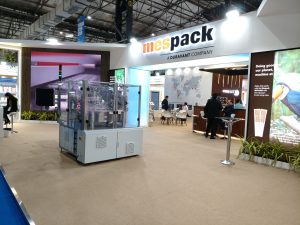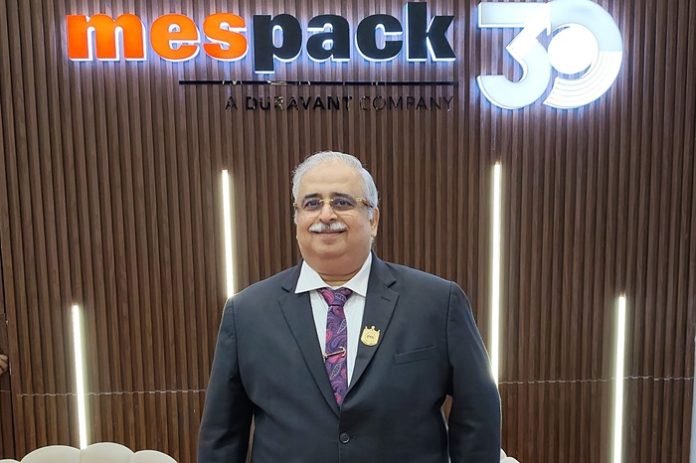Mespack India, a provider of advanced packaging solutions, showcased a compact, user-friendly machine targeting emerging markets at the PackMach Asia Expo 2024 in Mumbai. The RM260 SC can fill pre-made stand-up pouches that are automatically fed from a manually loaded in-feed conveyor and individually collected in order to enter the machine. This model is operable with zip pouches as well. The RM260 SC is operational with dosing powder, granules, and pieces products. The machine includes a rejection system for unopened pouches or unfilled pouches.
Anthony Dsouza, managing director of Mespack India, discussed with Packaging South Asia the machine’s features and the company’s approach to addressing the needs of smaller companies and customers.
Dsouza explained that the company’s new compact machine was designed specifically for two-tier and three-tier companies with limited product volumes. In contrast to large, costly equipment often available in the market, this machine provides an affordable, space-efficient option for small businesses aiming to enhance their packaging quality.
“We realized these customers need a solution for multiple small-batch products. They often rely on manual processes with hand-sealers, which lack the quality finish of professional packaging,” Dsouza said. “Our new machine is compact, affordable, and delivers that professional look without high costs.”

Mespack says its latest offering is a game-changer, featuring an easy and extremely quick changeover time between pack sizes, making it ideal for businesses with diverse product lines, Dsouza said. “For those packaging 15 or more product variants – such as tea in different weights – this machine saves significant time,” Dsouza noted. Launched in June 2024, the machine has already garnered attention at the expo. “Our message is clear: we listen to industry needs, and we deliver.”
The primary market for this compact packaging machine is emerging economies, including India, where demand is surging among smaller companies. While larger manufacturers have access to premium packaging machinery, Dsouza argued that Mespack wants to empower smaller players with cost-effective, high-quality solutions.
Dsouza also highlighted a shift in the Indian packaging industry, driven by rising consumer expectations for hygienically packaged goods, a trend accelerated by the COVID-19 pandemic. “Before the pandemic, packaging’s value was less understood,” he said. “The pandemic changed everything, making people aware of the benefits of sealed, safe packaging.” This increased demand for packaged goods extends beyond large companies to smaller businesses in rural areas, who are now keen to access quality packaging solutions to reach broader markets.
The Indian packaging market, Dsouza observed, is primed for exponential growth, especially in the food and beverage sectors. He predicted rapid development in the coming years as more small-scale manufacturers enter the formalized packaging market. “The industry will see enormous growth in the coming years – not just incremental but in leaps,” he said. “Packaging companies must adapt, innovate, and capture these opportunities to stay competitive.”
Talking about the PackMach Asia Expo, Dsouza remarked on the event’s vibrant atmosphere and increasing footfall, which he attributes to the industry’s booming growth. “Indian packaging is a flourishing sector,” he said. “The next three to four years will be crucial as stakeholders adapt to meet the rising demand.”











